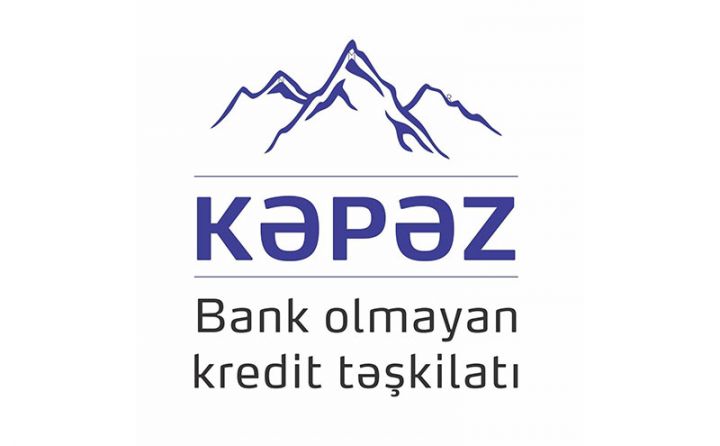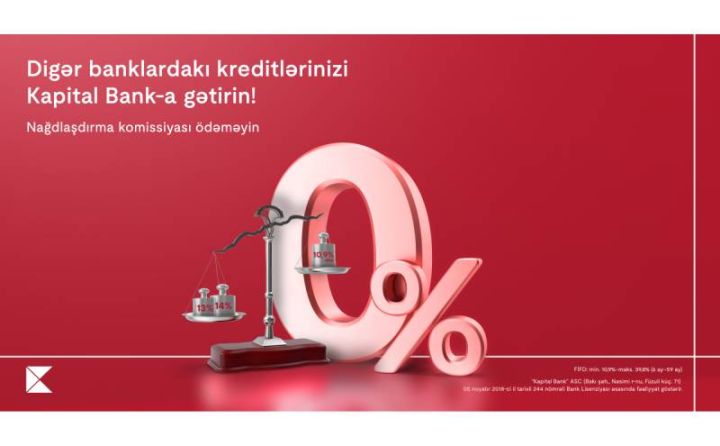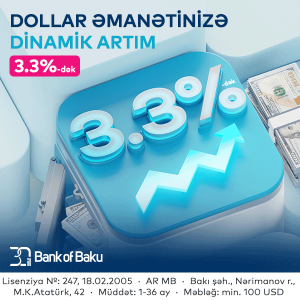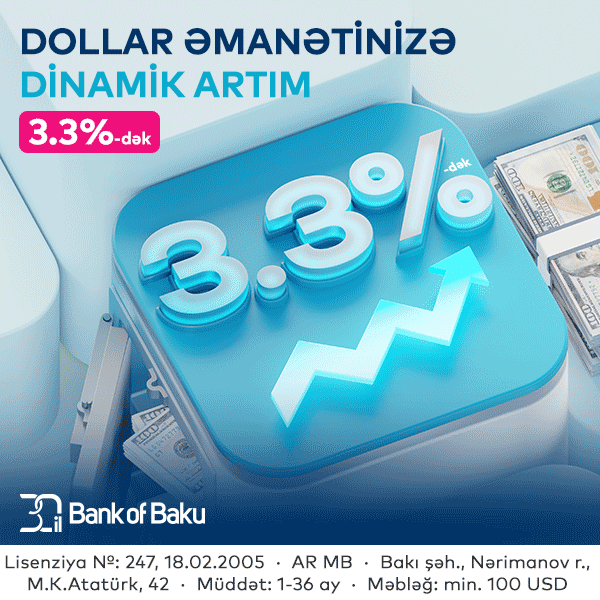"Hazırkı neft qiymətləri Azərbaycanda iqtisadi artımı dəstəkləyəcək"

Neft qiymətlərinin hazırkı səviyyəsi Azərbaycan iqtisadiyyatının mülayim artımını dəstəkləyəcək.
Bu barədə “Moody’s” beynəlxalq reytinq agentliyinin hesabatında deyilir.
Agentliyin proqnozlarına əsasən, orta müddətli perspektivdə neftin qiyməti bir barrel üçün 40-60 dollar təşkil edəcək.
Mütəxəssislərin fikrincə, bu cür qiymətlər Azərbaycanda, Rusiyada və Qazaxıstanda ticarət üzərində olan təzyiqi azaldır.
Ümumlikdə qeyd olunur ki, 2018-ci ildə MDB ölkələri üçün suveren kreditqabiliyyətliliyi sabit qalacaq.
Moody's: Outlook for CIS sovereigns is stable, but region vulnerable to negative shocks
Moody's Investors Service ("Moody's") says that the outlook for sovereign creditworthiness in the Commonwealth of Independent States (CIS) in 2018 is stable overall, in view of the healthy economic growth and stable oil prices seen after the region-wide economic shock of 2014-16.
However, the legacy of higher government debt, high levels of economy-wide foreign-currency debt and banking sector weaknesses leave sovereigns in the CIS vulnerable to negative shocks, which could stem from sharply rising interest rates and/or significant local-currency depreciation in 2018.
Furthermore, political tensions remain an ongoing source of risk to economic stability and reform momentum in the region.
Moody's conclusions are contained in its just-released report on the CIS, "Sovereigns -- Commonwealth of Independent States: 2018 outlook stable as healthy growth balances debt, banking and political risks". As of 30 January 2018, the ratings for 8 of 10 CIS sovereigns carry stable outlooks, with ratings for Russia (Ba1 positive) and Ukraine (Caa2 positive) carrying positive outlooks.
Vulnerabilities to shocks are highest for those CIS sovereigns which exhibit high and rising debt levels and lower fiscal flexibility. In this context, Moody's estimates that the median level of government debt as a share of GDP in the CIS will rise to around 55% in 2018 from around 32% in 2013.
In terms of specifics, fiscal space has diminished significantly in Ukraine, Armenia (B1 stable), Azerbaijan (Ba2 stable), Belarus (Caa1 stable) and Tajikistan (B3 stable), where government debt has risen sharply and interest payments have increased from low levels. Fiscal flexibility is also constrained by the existence of large operating spending commitments, which tend to be difficult to curb.
Moody's further notes that Russia's recovery will boost exports and remittances across the region. Moreover, the fact that most trade is intra-regional will help reinforce demand for goods and services exports across the CIS.
Current levels of oil prices relieve pressure on terms of trade in Russia, Kazakhstan and Azerbaijan. However, range-bound oil prices will prevent a return to pre-2014 growth rates beyond the initial recovery. Moody's expects oil prices to remain within a range of $40 to $60 per barrel over the medium term, which will support modest growth for oil exporters in the coming years.
The favourable economic backdrop provides an opportunity for policymakers to rebuild fiscal buffers following the widening of deficits and rise in government debt since 2014, accelerate economic and institutional reforms and address weaknesses in banking sectors. But weak institutional frameworks overall, and compared to other regions, will continue to constrain policy effectiveness.
Moody's also notes that the credit implications of a gradual shift in financing conditions are embedded in its ratings. However, a sudden change would have material credit implications for many CIS sovereigns, given elevated public debt, low reserve coverage of forthcoming maturities, a large share of foreign currency debt and highly dollarised banking systems.
In addition, geopolitical and domestic political risks -- representing largely moderate to high-probability and high-impact events in the region -- will remain prominent in 2018 and could threaten economic stability and reform momentum.
Müştərilərin xəbərləri

“ConsultsPlus”dan yeni layihə: “Risk əsaslı yanaşma” kiçik və orta bizneslər üçün daha əlçatan olacaqdır
SON XƏBƏRLƏR
-
25 d. əvvəl
Bakı-Ağstafa-Bakı marşrutu üzrə əlavə qatar reysləri təyin edilib
-
34 d. əvvəl
Azərbaycanda tikinti sahəsində agentliyin və ya komitənin yaradılması təklif olunur
- 39 d. əvvəl
-

- 41 d. əvvəl
-
43 d. əvvəl
Rabitəbank müştəriləri biznes hesablarını banka gəlmədən aça bilərlər!
- 3 saat əvvəl
- 4 saat əvvəl
- 19 saat əvvəl
-
19 saat əvvəl
Avstriyanın “Grabher Group” şirkətilə birgə sənaye layihələri müzakirə edilib
- 19 saat əvvəl
- 20 saat əvvəl
- 20 saat əvvəl

Azərbaycanda tikinti sahəsində agentliyin və ya komitənin yaradılması təklif olunur

Sabah 30 dərəcə isti olacaq - PROQNOZ

Bank Masallıda filialını açdı

Rəsmi məzənnələr açıqlandı

Sabahın rəsmi məzənnəsi müəyyən olunub
Ən çox oxunanlar

"Kəpəz" BOKT illik 14 faizlə borc alır

MG MOTORS AZƏRBAYCAN-dan “XÜSUSİ QİYMƏT” kampaniyası

Kreditlərinizi Kapital Bank-a gətirin nağdlaşdırma komissiyası olmadan kredit əldə edin

Dünyanın ən məşhur idman və əyləncə kanalları indi “CityNet”də!

Motosikllər və elektrik mühərrikli velosipedlər 15 %-lik gömrük rüsumuna cəlb ediləcək

“ConsultsPlus”dan yeni layihə: “Risk əsaslı yanaşma” kiçik və orta bizneslər üçün daha əlçatan olacaqdır

Valyuta hərracında dollara tələb artıb - HƏRRACIN NƏTİCƏSİ

























